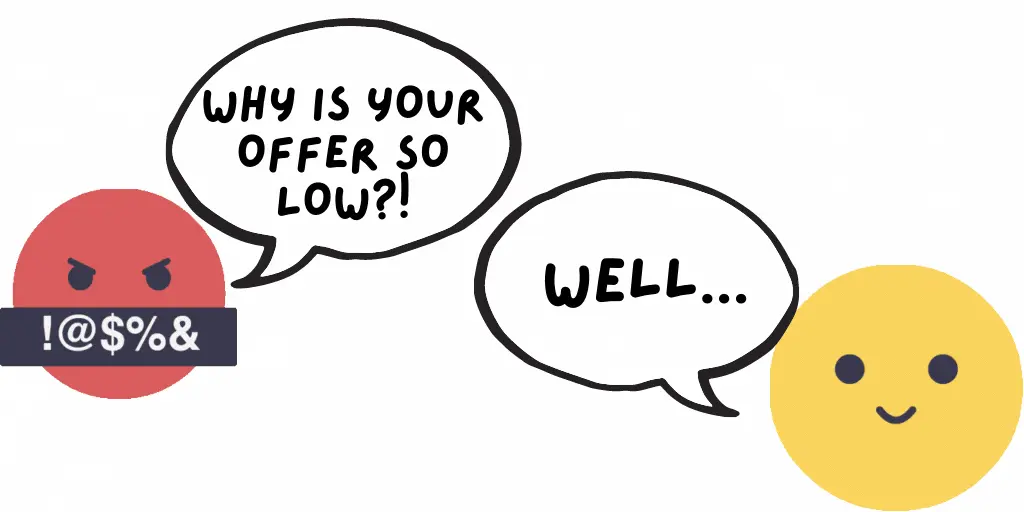
As a real estate investor, you have to make low offers and lots of them.
In order to make money in this business, you need to buy properties at below-market prices and re-sell them in the future for a significantly higher price than you paid. This is how the business model works.
If you've ever sent out a lot of low offers, you already know that most of them won't get accepted.
The vast majority of them will be ignored, and some of them will trigger an angry response from the person you send it to.
And in some cases, the seller may simply ask you (politely or impolitely),
“Why is your offer so low?”
How Should You Respond?
It's a simple yet surprisingly tricky question because you won't always know what angle a seller is coming from.
They may think their property is worth much more and want you to raise your offer.
They may also have no idea what their property is worth, and since they have no objective basis for what the number should be, they want to hear your rationale on how you arrived at your number.
Whatever the situation, you can respond to this question in a few different ways. Let's look at a few options…
Option 1: Continue the Dialogue
One option is to continue your dialogue with the seller.
Sometimes a deal can still be done, but you'll only find out if you keep the conversation going.
How can you keep the conversation going? You can ask them for more information about,
- What kind of offer they would accept?
- How much do they think their property is worth, and why?
- Why they don't like your offer (why isn't this an obvious “yes” for them)?
By continuing the dialogue, they may even reveal some material facts about the property that actually do make a big difference in its value, for better or worse.
It's possible that the seller's lowest acceptable offer price isn't much higher than your original offer.
Here are some ways to respond to the seller…
“Thanks for asking! Can you tell me what you think the property is worth, and how you arrived at your number? Sometimes we overlook certain characteristics and miscalculate our offer prices. If you can help me understand what I missed, I can take a second look and see if we can make any adjustments.”
“It's possible we miscalculated our offer. Can you tell me how far off we were from the number you had in mind?”
“I understand our offer price is lower than market value. As a real estate investment company, this is how our business model works. It's also part of why we're able to close so quickly, pay for all of your closing costs and help you avoid paying thousands to a realtor. What is the rock-bottom price you would be willing to consider?”
The goal of this approach isn't to convince the seller that your number is right or that it's the best offer they'll ever get. The goal is to understand how much higher you'll have to go to make them happy.
Their lowest acceptable offer price may not be acceptable to you, and that's okay. You can always say, “Thanks, but no thanks”, but you'll only find this out if you continue the dialogue.
Option 2: Stand Your Ground
You'll often have no reason to adjust your offer price. Especially if you've already done your research and you're confident about the price you'll have to pay to make money, it doesn't matter what the seller thinks.
Your offer is what it is, and continuing the dialogue won't be useful.
In these cases, the purpose of your response isn't to gather more information or figure out what number works for the seller. The goal is to help the seller see that you probably understand their property's value better than they do. If you're talking to the right kind of motivated seller and you communicate this well, they may realize it's in their best interests just to say “yes” and keep moving forward.
Any of these responses can work…
“I'm a real estate investor and my business model requires me to buy properties below their market value. You may be able to get more than my offer price if you'd like to list it with an agent. This usually involves waiting for several months (sometimes years) and you'll lose a good chunk of the sales proceeds when you pay your agent's commissions and cover other closing costs, etc. If you have no timeline or urgency to sell, that could work better for you. However, if you'd like to get this sold right now, we can pay you cash and close in the next few weeks. Keep me posted if you change your mind!”
“Our offer is based on extensive market research and comparable sales data in your area. It also factors in the closing fees, property taxes, and other closing costs we will pay on your behalf. There are several hidden costs that we will have to cover, which is reflected in this lower offer price.”
“Unfortunately, our cash reserves are limited and this is all we have available right now.”
Remember, just because a seller is asking you why your offer is low doesn't mean they won't accept it. They may be fine with your offer price, but curious about why you're interested in their property, how your business works, and what your angle is.
If they come right out and say,
“Your offer is too low,”
you could also respond with,
“Low compared to what?”
If the seller believes their property is worth a certain amount, ask them to provide some material evidence as to why they think the value is what they say. If they think your offer is too low, ask them to explain what they think the property is worth and how they came up with that number.
Especially if you're dealing with an apathetic seller, they will rarely have an objective, unbiased, data-driven answer. This is also true with vacant land properties because the data for land is much harder to find and often doesn't exist (and if the data does exist, you should already have that and be able to recite it to them).
RELATED: How to Find the “Market Value” of Vacant Land
Option 3: Lower Your Offer
That's right! In some cases, you may actually want to lower your offer.
For instance, if you learn new information about the property that makes it worth even less than it was before, this can be a legitimate reason to bring your offer lower.
This can have an interesting psychological effect on a seller, especially when they have a delusional idea about what their property is worth. If you can honestly point out material issues with their property that significantly diminish its value or usability, let them know about it and how it affects what you're able to pay.
This isn't about manipulation; it's about helping them see the full picture and understand reality.
Sometimes, a seller may be unwilling to accept your offer today, but they'll be back.
I've had countless experiences of extending my offer to a seller, and after hearing back that my offer was too low for them, I said something polite like,
“This is the most I'm able to pay you. If that doesn't work, I wish you all the best in finding a buyer elsewhere.”
After the seller and I part ways, one month goes by, six months go by, twelve months go by, sometimes YEARS will go by, and they eventually come back once they realize their property wasn't as valuable as they thought, or perhaps they didn't have the know-how to sell it on their own.
When this happens, the seller is showing me their hand. Now they're REALLY motivated, and they're basically telling me to name my price.
Unless the property is clearly a grand slam deal that I'd be foolish to walk away from, I'll usually lower my price by 20% – 40% of my previous offer to make sure I can't lose. A seller will rarely say “no” a second time, even with a lower price like this. If they had better options, they would've taken them before returning to me.
You can also do this if there's been a material change to your financial situation. For example, if your original contract has expired and the seller still wants to come back and do the deal… if you legitimately don't have the money anymore, there's no reason you can't send them a lower offer than your original one and explain,
“Our cash reserves have been depleted since the last time we talked about this property, and this is the most we're able to offer at this point.”
Whatever the case, don't forget that lowering your offer is sometimes the only sensible way to proceed (if you proceed at all).
Having patience and lowering your price can pay off in a BIG way.
Option 4: Go Silent
In most cases, the idea of “ghosting” someone is an immature, unprofessional way to handle a question or objection; whether it's in a business or personal context… but I'll be honest with you, there are some situations where the best response is no response.
For instance, when I'm sending out thousands of mail pieces at a time, I always expect responses from people I'm not going to work with… either because they want something I can't deliver, or they're just mean and rude.
If someone has demonstrated there will be no alignment between my abilities and their expectations; I have no problem simply ignoring their messages because neither they nor I will benefit from continuing the conversation.
This is where a buying website, services like PatLive, or an automated phone system with a good voicemail greeting can be particularly useful because it adds a degree of separation between myself and the people who try to call me.
These systems make it easy for me to figure out who each caller is and decide which people I want to respond to. I'm not obligated or forced into a conversation with someone I shouldn't be talking to in the first place.
Remember: You Don't Owe The Seller Anything
At the end of the day, if a seller isn't going to accept your offer (however much or little it is), you aren't obligated to give them an explanation or justify your numbers.
Granted, you'll probably walk away from some opportunities if you aren't willing to have these conversations and make a compelling case for why your offer is worth their consideration, but even so, there's no law saying you NEED to haggle with a seller.
Nobody is entitled to know the inner workings of your business, your plan with the property or how much you think you can make from it. It's up to you to pick your battles and decide which properties are worth negotiating over.
















